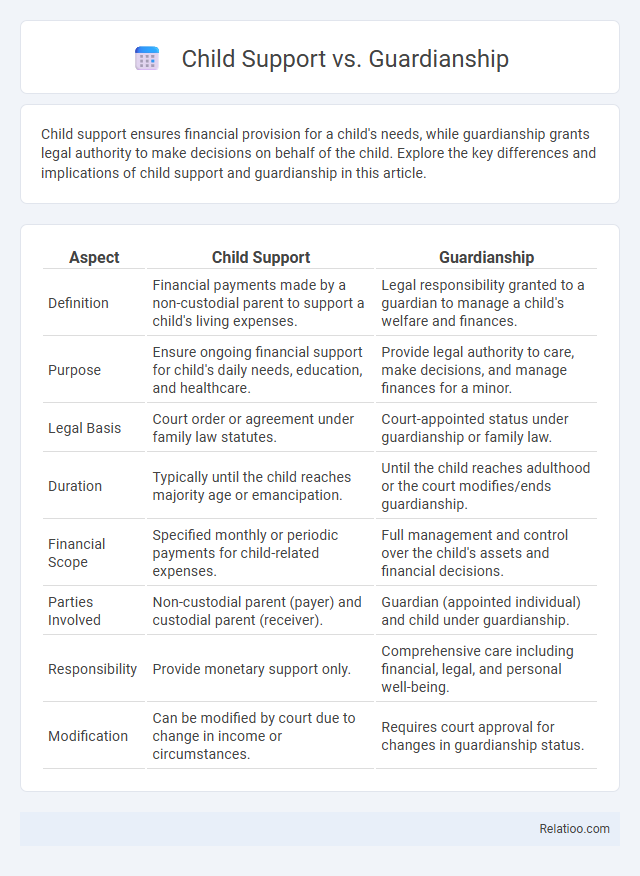Child support ensures financial provision for a child's needs, while guardianship grants legal authority to make decisions on behalf of the child. Explore the key differences and implications of child support and guardianship in this article.
Table of Comparison
| Aspect | Child Support | Guardianship |
|---|---|---|
| Definition | Financial payments made by a non-custodial parent to support a child's living expenses. | Legal responsibility granted to a guardian to manage a child's welfare and finances. |
| Purpose | Ensure ongoing financial support for child's daily needs, education, and healthcare. | Provide legal authority to care, make decisions, and manage finances for a minor. |
| Legal Basis | Court order or agreement under family law statutes. | Court-appointed status under guardianship or family law. |
| Duration | Typically until the child reaches majority age or emancipation. | Until the child reaches adulthood or the court modifies/ends guardianship. |
| Financial Scope | Specified monthly or periodic payments for child-related expenses. | Full management and control over the child's assets and financial decisions. |
| Parties Involved | Non-custodial parent (payer) and custodial parent (receiver). | Guardian (appointed individual) and child under guardianship. |
| Responsibility | Provide monetary support only. | Comprehensive care including financial, legal, and personal well-being. |
| Modification | Can be modified by court due to change in income or circumstances. | Requires court approval for changes in guardianship status. |
Understanding Child Support: Definition and Purpose
Child support is a legal obligation requiring a noncustodial parent to provide financial assistance for a child's living expenses, education, healthcare, and overall welfare. Unlike guardianship, which grants decision-making authority and care responsibilities, child support specifically addresses monetary contributions to support the child's needs. Understanding child support's purpose clarifies its role in ensuring the child's well-being regardless of custody or guardianship arrangements.
What is Guardianship? Key Concepts Explained
Guardianship is a legal relationship where a designated adult, the guardian, is given the authority and responsibility to care for a child when the biological parents are unable to do so. Unlike child support, which involves financial payments made by a non-custodial parent for the child's upbringing, guardianship grants decision-making rights over the child's welfare, education, and healthcare. Your understanding of guardianship is crucial for navigating legal responsibilities and protecting the child's best interests.
Legal Differences Between Child Support and Guardianship
Child support legally mandates financial responsibility from a non-custodial parent to ensure a child's well-being, focusing solely on monetary contributions. Guardianship establishes a legal relationship granting an individual the rights and duties to care for a child's personal and financial needs, often including but not limited to financial support. Unlike child support, guardianship involves custodial authority and decision-making responsibilities beyond financial aid.
Financial Responsibilities: Child Support vs Guardianship
Financial responsibilities in child support involve regular payments by a non-custodial parent to assist with the child's living expenses, healthcare, and education. Guardianship entails a broader financial obligation, as guardians manage all aspects of the child's welfare, including housing, schooling, and medical costs, often without court-ordered payment structures. Child support is typically mandated by family courts, while guardianship financial duties arise from legal authority to act on the child's behalf.
Who Can Apply: Eligibility for Child Support and Guardianship
Eligibility for child support generally applies to biological or legal parents, guardians, or custodians responsible for a child's financial needs. Guardianship can be sought by relatives, family friends, or other adults demonstrating the ability to care for the child and acting in the child's best interests. Child support applications require proof of parentage or legal responsibility, while guardianship demands a court-approved appointment establishing legal authority over the child.
Parental Rights: How Child Support and Guardianship Affect Them
Child support establishes a legal obligation for parents to financially contribute to their child's upbringing, but it does not grant or alter parental rights. Guardianship, on the other hand, involves a court-appointed authority that legally manages the child's welfare, which can include decision-making rights and may temporarily or permanently affect the biological parents' rights. Your parental rights remain intact when paying child support alone, but guardianship appointments can shift legal responsibilities and rights, impacting your role in your child's life.
Court Processes: Obtaining Child Support or Guardianship
Court processes for obtaining child support require filing a petition to establish financial responsibility, often involving income verification and enforcement hearings. Guardianship involves a more complex legal procedure where you must prove the best interest of the child through evaluations and court investigations. Both processes demand thorough documentation, legal representation, and adherence to state-specific family law regulations.
Duration and Termination: How Long Each Obligation Lasts
Child support obligations typically last until the child reaches the age of majority or completes secondary education, but can extend longer in cases of disability. Guardianship duration depends on the court's decision or the child's emancipation, often continuing until the child turns 18 or becomes legally independent. Termination of guardianship ends parental rights and responsibilities, whereas child support obligations may continue even after guardianship ceases if financial responsibility remains legally required.
Impact on the Child: Well-being and Legal Status
Child support ensures the child's financial needs are met, directly contributing to their well-being by providing resources for education, healthcare, and basic living expenses. Guardianship involves legal authority and responsibility for the child's overall care, impacting the child's stability, decision-making, and protection under the law. While child support addresses economic support from non-custodial parents, guardianship establishes who holds legal custody, shaping the child's legal status and daily care environment.
Choosing the Right Option: Factors to Consider
Choosing between child support and guardianship requires evaluating financial responsibility, legal authority, and the child's best interests. Child support ensures ongoing financial aid from non-custodial parents, while guardianship confers decision-making power and care duties to a guardian. Key factors include parental capability, stability, and the child's welfare to determine which legal arrangement best supports the child's needs.

Infographic: Child Support vs Guardianship
 relatioo.com
relatioo.com